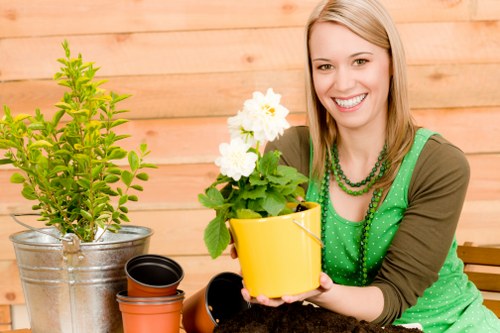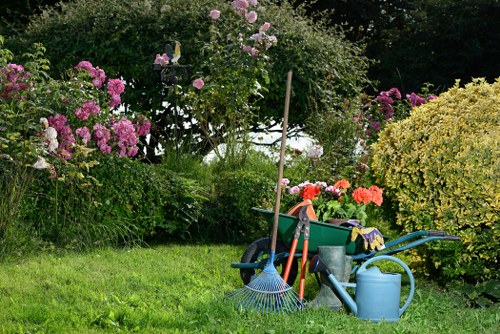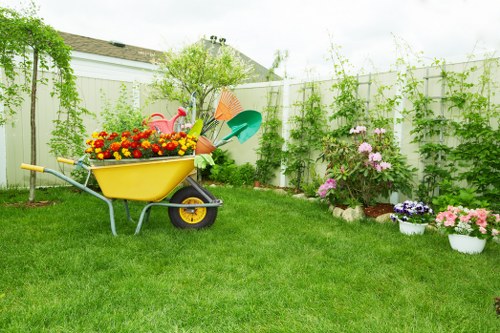Comprehensive Guide to Garden Maintenance in East Ham

Introduction to Garden Maintenance
Maintaining a beautiful garden in East Ham requires a blend of passion, knowledge, and the right techniques. Whether you're a seasoned gardener or a novice, understanding the unique climate and soil conditions of East Ham is crucial for thriving plants and vibrant foliage.
Regular garden maintenance not only enhances the aesthetic appeal of your outdoor space but also promotes the health and longevity of your plants. From pruning and weeding to seasonal planting, each task plays a vital role in creating a lush and inviting garden.
In this article, we'll explore essential garden maintenance tips tailored specifically for East Ham residents, ensuring your garden remains a stunning oasis all year round.

Understanding East Ham's Climate
Climate Overview
East Ham experiences a temperate maritime climate, characterized by mild winters and cool summers. This climate is generally favorable for a wide variety of plants, but it's essential to consider specific weather patterns when planning your garden maintenance schedule.
Rainfall is fairly evenly distributed throughout the year, reducing the risk of prolonged droughts. However, occasional heavy rains can lead to waterlogged soil, so proper drainage is vital to prevent root rot and other moisture-related issues.
Understanding these climatic conditions helps in choosing the right plants and implementing effective maintenance practices that align with East Ham's weather patterns.

Soil Preparation and Care
Testing and Amending Soil
The foundation of a healthy garden lies in well-prepared soil. Conducting a soil test helps determine pH levels, nutrient content, and soil composition. In East Ham, where clay soils are common, amending the soil with organic matter like compost can improve texture and fertility.
Adding organic matter enhances soil structure, promoting better aeration and drainage. It also supports beneficial microorganisms that contribute to plant health. Regularly incorporating compost or well-rotted manure can significantly boost your garden's productivity.
Mulching is another effective practice for soil maintenance. A layer of mulch conserves moisture, suppresses weeds, and regulates soil temperature, creating an optimal environment for plant roots to thrive.

Essential Garden Tools for Maintenance
Investing in Quality Tools
Having the right tools is indispensable for efficient garden maintenance. Essential tools include a reliable garden fork, sharp pruners, sturdy gloves, and a durable watering system. Investing in high-quality tools not only makes tasks easier but also ensures longevity and better performance.
Regularly maintaining your garden tools by cleaning and sharpening them extends their lifespan and ensures they function effectively. Proper tool maintenance also minimizes the risk of plant damage during gardening activities.
Consider ergonomic designs to reduce strain and improve comfort during extended gardening sessions. Tools that fit well in your hands can enhance precision and efficiency, making garden maintenance a more enjoyable experience.
Recommended Tools:
- Pruning Shears
- Garden Fork
- Watering Hose with Adjustable Nozzle
- Hand Trowel
- Gloves

Seasonal Garden Maintenance Tips
Spring Maintenance
Spring is the perfect time to rejuvenate your garden after the winter months. Begin by clearing out debris and dormant plants. Prune overgrown shrubs and trees to encourage new growth and maintain their shape.
Planting seasonal flowers and vegetables ensures a vibrant and productive garden. Incorporate frost-resistant plants to withstand occasional late spring chills. Regular watering and fertilization during this period set the stage for a flourishing summer.
Summer Care
During the summer, focus on managing heat stress and maintaining soil moisture. Implementing drip irrigation systems can provide consistent watering while conserving water. Mulching helps retain soil moisture and keeps plant roots cool.
Regularly inspect plants for pests and diseases, addressing issues promptly to prevent widespread damage. Deadheading spent flowers encourages continuous blooming and maintains the garden's aesthetic appeal.
Autumn Preparations
As temperatures drop, begin preparing your garden for winter. Remove spent plants and clear fallen leaves to prevent fungal growth and pest infestations. Planting hardy perennials ensures color and life returns in the spring.
Protect sensitive plants by applying mulch or using protective covers. Pruning before the first frost can reduce damage and shape plants for the coming year.
Winter Maintenance
Winter garden maintenance involves protecting plants from harsh weather conditions. Ensure proper drainage to prevent waterlogging from snowmelt. Continuing to monitor for pests is essential, as some may seek shelter in your garden during colder months.
Utilize protective cloches or cold frames to shield delicate plants. Planning and strategizing for the next gardening season during winter lays the groundwork for a successful and well-maintained garden.
- Clear debris
- Prune and shape plants
- Plant perennials
- Protect sensitive species
- Plan for next season
Common Challenges in East Ham Gardens
Pest Management
Garden pests can pose significant challenges, but with proactive measures, you can minimize their impact. Regularly inspecting plants for signs of infestation allows for early intervention. Implementing natural pest control methods, such as introducing beneficial insects or using organic repellents, can effectively manage pest populations without harming the environment.
Maintaining plant health through proper watering and fertilization also reduces susceptibility to pests and diseases. Healthy plants are more resilient and can better withstand attacks, ensuring your garden remains vibrant and pest-free.
Disease Prevention
Fungal and bacterial diseases can quickly spread in gardens, especially in damp climates like East Ham. To prevent diseases, ensure proper spacing between plants to promote air circulation, reducing humidity levels around foliage.
Avoid overhead watering, which can lead to waterlogged leaves and foster disease development. Implementing a regular cleaning regimen for garden tools prevents the spread of pathogens from one plant to another.
Weed Control
Weeds compete with your plants for nutrients, water, and light, hindering their growth and productivity. Regular weeding, especially during the growing season, helps maintain a clean and organized garden space.
Mulching is an effective strategy for suppressing weed growth while enhancing soil quality. For persistent weeds, consider using eco-friendly herbicides or manual removal to prevent further spread.
- Regular inspections
- Natural pest repellents
- Proper plant spacing
- Mulching
- Eco-friendly herbicides
Choosing the Right Plants for East Ham
Native vs. Non-Native Plants
Selecting plants that are well-suited to East Ham's climate and soil conditions is paramount for successful garden maintenance. Native plants are inherently adapted to the local environment, requiring less maintenance and offering resilience against regional pests and diseases.
However, incorporating non-native species can add diversity and unique aesthetic appeal to your garden. Ensure that any non-native plants chosen are not invasive and can thrive without disrupting the local ecosystem.
Flowering Plants
Flowering plants bring color and vibrancy to your garden. Consider perennials like lavender, roses, and daisies that provide continuous blooms throughout the seasons. Annuals such as petunias and marigolds offer seasonal bursts of color and can be replaced each year for sustained vibrancy.
Vegetable Gardens
Growing your own vegetables in East Ham not only promotes sustainability but also provides fresh produce for your household. Opt for vegetables like tomatoes, cucumbers, and leafy greens that thrive in the local climate. Implementing crop rotation practices enhances soil fertility and reduces pest buildup.
Container Gardening
If space is limited, container gardening is an excellent alternative. Utilize pots and raised beds to grow herbs, small vegetables, and ornamental plants. Container gardening offers flexibility and easy mobility, allowing you to adjust plant placement based on sunlight and weather conditions.
- Choose drought-resistant varieties
- Implement crop rotation
- Utilize raised beds
- Incorporate vertical gardening techniques
- Select suitable container sizes
Eco-Friendly Garden Practices
Water Conservation
Water conservation is crucial for sustainable garden maintenance in East Ham. Implementing efficient watering systems, such as drip irrigation, ensures that plants receive adequate moisture without excessive water usage.
Collecting rainwater through rain barrels and using it for irrigation reduces reliance on municipal water sources. Additionally, scheduling watering during early morning or late evening minimizes evaporation and maximizes water absorption by plant roots.
Organic Gardening
Adopting organic gardening practices promotes environmental sustainability and healthier plant growth. Avoiding synthetic fertilizers and pesticides minimizes soil and water contamination, fostering a thriving ecosystem of beneficial insects and microorganisms.
Composting kitchen scraps and garden waste recycles nutrients back into the soil, enhancing its fertility naturally. Organic mulches, such as straw or wood chips, support soil health and structure while suppressing weed growth.
Reducing Chemical Usage
Minimizing the use of chemical pesticides and fertilizers is essential for maintaining a healthy garden environment. Opt for natural alternatives like neem oil, insecticidal soaps, and organic fertilizers to manage pests and nourish plants effectively.
Implementing integrated pest management (IPM) strategies combines biological, cultural, and mechanical methods to control pest populations sustainably, reducing the need for chemical interventions.
- Install rainwater harvesting systems
- Use natural pest control methods
- Compost organic waste
- Apply organic mulches
- Implement integrated pest management
Professional Garden Maintenance Services in East Ham
Benefits of Hiring Professionals
While DIY garden maintenance is rewarding, enlisting the help of professional garden maintenance services in East Ham offers numerous advantages. Professionals bring expertise, experience, and access to specialized tools, ensuring your garden receives top-notch care.
Hiring experts can save you time and effort, allowing you to enjoy a beautiful garden without the stress of managing every detail. Professionals can also provide personalized recommendations tailored to your garden's unique needs and your aesthetic preferences.
Services Offered
Garden maintenance services typically include lawn care, pruning, weeding, pest control, soil management, and seasonal planting. Many providers also offer landscape design and installation, transforming your outdoor space into a stunning retreat.
Periodic maintenance contracts ensure regular upkeep, preventing minor issues from escalating into significant problems. Customized service packages cater to both residential and commercial gardens, accommodating various scales and requirements.
Choosing the Right Service Provider
When selecting a garden maintenance service in East Ham, consider factors such as experience, reputation, and range of services offered. Reading reviews and seeking recommendations can help identify reliable providers who deliver consistent, quality results.
Ensure the service provider is licensed and insured, protecting your property and investment. Transparent pricing and clear communication are also essential for establishing a trustworthy and professional working relationship.
- Expertise and experience
- Comprehensive service offerings
- Positive customer reviews
- Licensing and insurance
- Transparent pricing
Contact professional garden maintenance services today to elevate your East Ham garden to new heights.
DIY Tips for Effective Garden Maintenance
Regular Monitoring
Consistent observation of your garden allows for early detection of issues such as pests, diseases, and nutrient deficiencies. Taking the time to regularly inspect plants ensures timely interventions, maintaining overall garden health.
Keeping a gardening journal can help track plant growth, weather patterns, and maintenance activities. This record aids in identifying trends and making informed decisions for future gardening endeavors.
Pruning and Trimming
Pruning is essential for shaping plants, promoting air circulation, and removing dead or diseased branches. Regular trimming encourages healthy growth and enhances the structural integrity of trees and shrubs.
Use sharp, clean tools to make precise cuts, minimizing stress and potential damage to plants. Understanding the specific pruning requirements for different plant species ensures optimal results.
Soil Nourishment
Feeding your garden with appropriate fertilizers supports robust plant growth and productivity. Choose fertilizers based on soil test results to address specific nutrient deficiencies.
Organic fertilizers, such as compost and bone meal, provide a slow-release nutrient source, enhancing soil health over time. Avoid over-fertilizing, which can lead to nutrient imbalances and environmental issues.
- Maintain a regular inspection schedule
- Prune plants correctly
- Use appropriate fertilizers
- Implement crop rotation
- Maintain proper watering practices
Empower yourself with these DIY garden maintenance tips to cultivate a thriving East Ham garden.
Conclusion
Effective garden maintenance in East Ham involves understanding the local climate, preparing and caring for the soil, selecting suitable plants, and implementing sustainable practices. Whether you choose to manage your garden independently or seek professional assistance, prioritizing regular upkeep ensures a flourishing and visually appealing outdoor space.
By integrating the tips and strategies outlined in this guide, you can overcome common gardening challenges and create a resilient, vibrant garden that serves as a sanctuary in your East Ham home.
Ready to transform your garden? Contact us today to schedule a consultation or book your service now and embark on the journey to a stunning East Ham garden.
